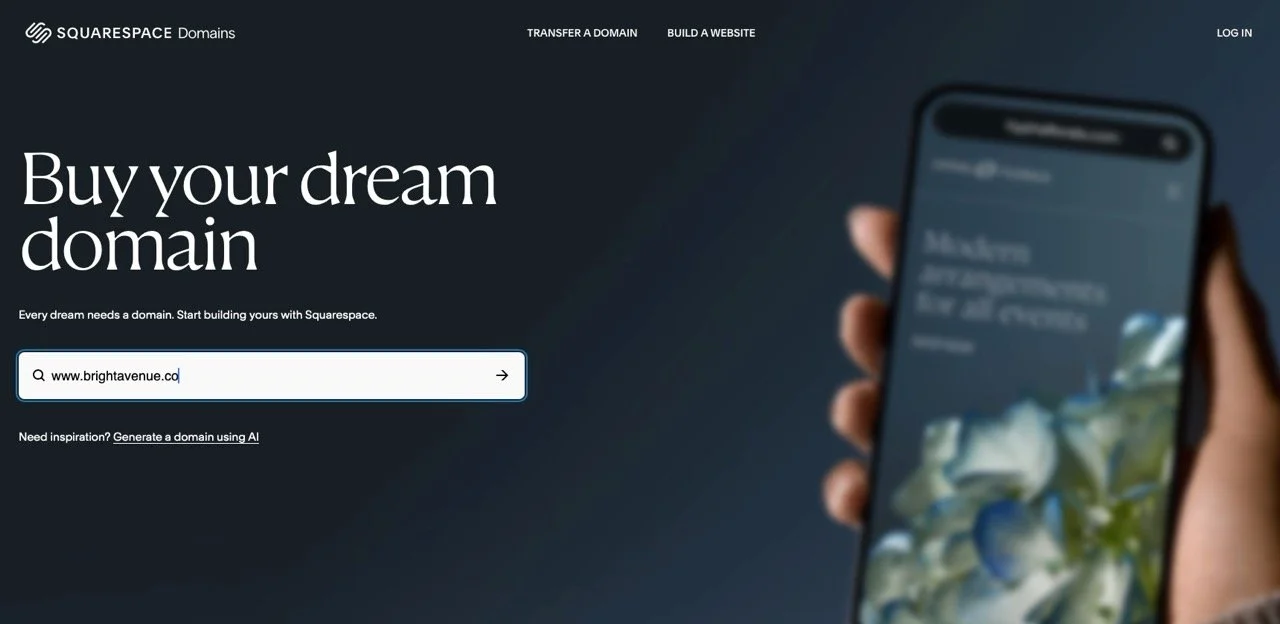How to get the domain for your small business: a complete guide
Getting a domain for your small business is a big step when building your online presence.
Because at the end of the day, your business domain name is the foundation for your website, email - and wider brand identity.
As someone who’s worked with many small businesses, I regularly get asked questions about domains.
Clients want to know what makes a good domain, how registration works…and if they need more than one domain for brand protection (e.g. having both .co.uk and .com domain extensions).
And there’s good news…
Registering a domain for your business is a lot easier when you know what to expect and what mistakes to avoid.
In fact, making the right decisions means understanding just a few basics.
Keep reading - and I’ll walk you through the main questions small business owners ask about domains - from picking a name to choosing your domain registrar.
1. What is a domain name?
Quite simply, your domain name is your digital address.
It's what people type into their browser to find your business online, like www.brightavenue.co.
People will use your domain to find you and (all being well) trust you.
2. Do I need a domain for my small business?
As a fellow small business owner my answer is 100% yes!
A domain name is your business's online address and allows clients to find you easily.
More than that, it’s part of your brands DNA.
Whilst you can always 'borrow' a domain from another company (so their brand sits within your address - for example brightavenue.mykajabi.com), having your own unique domain gives you a professional web address without relying on other platforms. And if you ever want to switch platform, your web address comes with you.
This is so important - I’d always avoid having a domain name that includes another brand name because it really ties you to them. This can cause problems down the line.
You own business domain will:
Enhance your professional credibility
Having your own domain will make your business look serious and legitimate, especially compared to free options.
For example, customers seeing an email like rachel@brightavenue.co instead of rachelhughes34982@gmail.com just feels more professional (this is not my personal email by the way!). This particularly matters when you're competing with bigger companies.
Help build your online brand
Your domain becomes your business's name online. It's what people remember and how they'll find you again.
I’d recommend buying your domain early on.
Because even if you're not quite ready for your own website, owning your domain protects your brand from day one.
Give you more search engine visibility (making it easier to show up in Google etc).
Having your own domain helps you show up in search results in Google, Bing etc because search engines take you more seriously than if you're using a free subdomain.
3. How do I choose the best domain name for my business?
Choosing the right domain name throws up all kinds of questions.
I was the same - when I launched Bright Avenue, the .co.uk and .com domains were already taken, and I went back-and-forth for ages. In the end, I chose a .co address because I really wanted to keep it simple.
Choosing the right domain name is about balancing brand identity, user experience, and a few technical details.
Go with something that's clear, memorable (and very importantly - won't have people constantly asking you to spell it out)!
Factors to consider when choosing a domain name for your small business
Length matters most: Keep domains under 15 characters if you can. Shorter names are easier to type and remember.
Keep spelling simple: Avoid tricky spellings or made-up words. You don’t want to confuse people - if people can't spell it, they won't find you.
Keyword relevance helps with discovery: Including a relevant keyword (words you’d like to be ranking for in google) will help people instantly understand what you do. For example, a physiotherapist might want 'physio' in their domain.
Think about where your business might be in a few years: 'gemmaspilates.com' might end up feeling too specific down the line, but 'gemmaswellness.com' opens up more doors.
Align your domain and business name
Matching your domain to your business name is always the goal because it creates the strongest brand connection possible.
When someone hears your business name, they should be able to guess your web address.
This kind of alignment will build trust and makes it easier for people to find you.
If your exact business name isn't available, get creative! Try adding 'company', 'consulting', or 'studio'. For example, 'magentamarketing.com' might become 'magentamarketingcompany.com'.
Remember, consistency across platforms matters so make sure your domain aligns with your social media handles and email address. It’s best to check social media handles are available before buying your domain.
Pro tip: Also double-check that your name doesn't clash with existing trademarks.
4. Domain extensions - should I choose .co.uk, .com or something else?
Picking the right domain extension depends on who you're targeting and what you want your business to say.
.com remains a safe bet. People expect it so won't be second-guessing whether they've got your web address right.
If you're UK-based, .co.uk has a lovely local feel. It says to potential clients that you understand their world - and an added bonus is it signals to Google that you’re a UK business when ranking.
| Extension | Best For | Benefits |
|---|---|---|
| .com | Global businesses | Universal recognition, trust |
| .co.uk | UK-focused businesses | Local credibility, regional SEO |
| .org | Non-profits | Authority, trustworthiness |
A couple more things:
Multiple extensions can help protect your brand: For example, if you have 'virtualassistantsally.com', think about also buying 'virtualassistantsally.co.uk' to stop competitors snatching it up. No need to go overboard though (budget is obviously important) - remember, you can always add more as you grow.
You can set up 301 redirects so all your domains point to your main site (your web designer can help with this). That way, whatever people type, they end up in the right place.
Industry-specific extensions can be brilliant at communicating what you’re all about: For example, extensions like .co, .studio, or .boutique instantly feel more creative.
5. How to register your domain name
Registering a domain means searching for availability, picking a domain registrar, and completing the process. I'd recommend the ICANN-accredited registrars including:
Squarespace (especially if you plan to host your website on Squarespace as it’s far easier to have everything in one place)
There isn’t a lot of variation in price for domains, expect to pay approximately £20 or less per year.
How to check if a domain name is available?
Start with a simple domain search on a registrar's website. Type your preferred name into their search tool and see what's available.
If your first choice is taken, most registrars suggest alternatives such as .co.uk, .co, or .net.
Try variations of your business name. If your exact match is taken, try adding a keyword that fits your brand e.g. physio, studio, company.
The process is straightforward: create an account in your chosen registrar, add your domain to the basket, and fill in your details.
You’ll need to:
Select your domain name and extension
Provide accurate contact information
Complete payment
Some registrars offer discounts for multi-year registration, which is often worth it and prevents losing your domain through forgotten renewals.
Remember to check renewal terms before signing up. Auto-renewal is always handy - however there can be surprise charges that sneak up on you.
In summary…
Your domain is important (for all the reasons I've covered), but don’t be disapointed if your first choice isn’t available.
Getting the perfect domain you've had your heart set on isn't the be-all-and-end-all.
Think about the last time you remembered, and manually typed a website domain directly into your browser.
These days, we mostly google-and-click or click on links from social media, emails, or other websites.
So yes, your domain choice matters - for credibility, for email addresses - for your overall brand cohesiveness. But if your ideal name is already taken, please don't lose sleep over it.
Pick something that is clear and memorable, and focus on building a brilliant business behind whatever domain you choose.





















